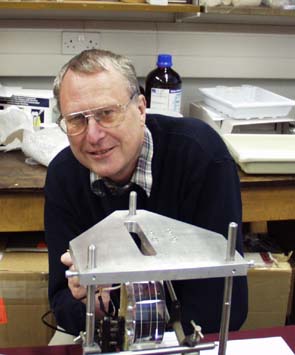Innovative astrophysical research which could finally test Einstein’s 100-year-old theory of relativity will be in focus on Wednesday (February 17) when the free Café Scientifique series continues in Aberdeen.
February’s edition of the University of Aberdeen’s popular Café Scientifique will explore how the detection of gravitational waves could open up a new window on our Universe.
Gravitational waves – waves in the fabric of space-time – are generated by the motion of massive objects in the Universe such a star exploding or black holes colliding. They are predicted by Einstein’s General Theory of Relativity but have still to be directly observed.
The world-renowned Institute for Gravitational Research at the University of Glasgow is developing detectors and signal analysis methods to search for gravitational waves from such astrophysical sources.
Professor Jim Hough, one of the leading figures behind the research, and a Fellow of the Royal Society, will discuss the pioneering work at Waterstone’s Union Bridge branch at 7pm on February 16.
He said: “People do believe that gravitational waves exist but it is important, in order to verify the theory of relativity, that they can be observed directly. Gravitational waves will provide a new way of looking at the universe.
“According to Einstein, it is not possible transmit any information faster than the speed of light but we know that if something happens out in the universe which changes the shape of the gravitational field, that information will get to us on earth.
“The question is how does it get to us and how do we detect it? The information cannot travel to us instantaneously so how is it sent? That is what we want to prove.”
The Café Scientifique Cityseries aims to encourage debate around current topics in science and Professor Hough hopes to demonstrate the value of astrophysical research, not only to our understanding of the universe but in helping to facilitate technological advances.
“The technology to build such experiments has to be at the forefront of what people understand,” he added.
“New techniques have been designed for parts of these experiments, furthering optics and laser technology, and having spin-offs into other fields of considerable value in everyday life.”
Café Scientifique Cityis free to attend, open to all and advance registration is not required for the events but visitors are encourage to come along early as capacity is limited.
For information on all of the Café Scientifique events visit: www.abdn.ac.uk/science/cafescience/or contact Dr Ken Skeldon Head of the University of Aberdeen’s Public Engagement with Science Unit by email at k.skeldon@abdn.ac.uk.
Café Scientifiqueis supported by a science engagement grant from the Scottish Government.


